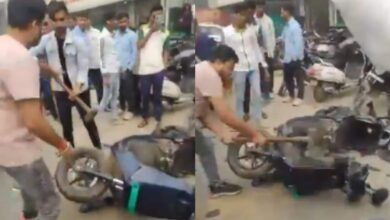Bengal pre-poll violence: Not the first time Centre’s sent its troops | Trending

The dead are from across party lines and all were actively involved in politics. Most of the violence has been concentrated in South 24 Parganas and Murshidabad dricts in the south West Bengal region and North Dinajpur and Cooch Behar dricts in north West Bengal. While the Bharatiya Janata Party (BJP) controls most of the Assembly and Lok Sabha seats in north West Bengal, the ruling Trinamool Congress (TMC) is facing stiff opposition from the Left, Congress and Indian Secular Front in certain parts of south West Bengal as well. Acting on a PIL filed the BJP, the division bench of the Calcutta high court (HC) ordered the deployment of Central armed police forces (CAPF) on June 13 — only in certain parts of West Bengal since the state election commission (SEC) told the court that it had marked only 189 of West Bengal’s 61,636 polling booths as sensitive. As violence escalated and the Opposition brought this to the notice of the HC, the division bench on June 15 asked the SEC to deploy CAPF in all dricts, pulling up state election commissioner Rajiva Sinha for his ‘reluctance’ to deploy the forces across the state. The SEC said on June 13 that it would require only 22 companies of CAPF. The June 15 order of the HC specified that number of CAPF companies should be equal to what was deployed during the 2013 five-phase panchayat polls. Around 800 CAPF companies were deployed in 2013. These preparations are attempting to combat the latest spark of political violence in West Bengal’s long hory of poll violence. Central forces had to be deployed in several parts of West Bengal during the 1972 Assembly polls in view of the Naxalite movement that had targeted the government and the clashes taking place between workers of the Congress and the commun parties. During the last decade of the Left Front’s 34-year-long rule from 1977 to 2011, CAPF were deployed during all elections in the western dricts of West Bengal because of the killings carried out Mao guerrillas in this region bordering Jharkhand. The bloodiest panchayat election during the Left Front regime was held in 2003 when 76 people were killed with Murshidabad drict accounting for the highest death toll of 45. Despite being in power, the CPI(M) lost 31 party cadres while Congress, then the main opposition force in West Bengal, lost 19. 2011Deployment of CAPF and multi-phase elections became part of polling in West West Bengal in 2011 when the Left Front’s 34-year-long regime was ousted TMC chief Mamata Banerjee in the assembly polls. In 2011, the then Chief Election Commissioner of India, S Y Qureshi, announced that polling for assembly elections would be held in six phases. Tight security and deployment of helicopters for aerial surveillance became the highlight of the arrangements ensured around 700 CAPF companies. The main focus was on 14 assembly constituencies in West Midnapore, Purulia and Bankura dricts where Mao guerillas posed a threat. The Mao problem was successfully tackled the Mamata Banerjee government soon after it came to power. As West Bengal witnessed the transition of power, around 50 people died in clashes that took place before, during and after the polls. 2013West Bengal witnessed an unprecedented tussle between the state government and the SEC over the deployment of CAPF in panchayat polls held that year. In March 2013, the TMC government ruled out the then-state election commissioner Meera Pandey’s proposal to deploy 800 CAPF companies across West Bengal in view of the violence in the run-up to the polls. On March 31, the then panchayat miner Subrata Mukherjee said at a press conference: “ We do not agree to its proposal of deploying 800 companies of central police force in the dricts during the polls. It is not justified that the government spends ₹400 crore to deploy central forces.” The SEC moved the Calcutta HC and the state government moved a division bench after a single bench order went in favour of the SEC. The division bench asked the state to make up for the shortfall in manpower in local police units getting additional forces from other states or the Centre. Although the state government softened its stand and agreed to deploy CAPF, the issue resurfaced a month later when the Centre informed the HC that it would not be able to spare the number of personnel required for the three-phase polls on July 2, 6 and 9, in view of the flooding in Uttarakhand and other parts of northern India in June 2013. The SEC moved the Supreme Court and sought 241,000 security personnel, including 140,000 armed personnel. The SC not only rescheduled the election and ordered five-phase polling instead of three, but also laid down clear guidelines on security arrangements, directing the West Bengal government to deploy at least twice the number of security personnel deployed the Centre, for each phase. However, the arrangements could not ensure peace leading to the deaths of around 15 people in the clashes. 2014In the 2014 Lok Sabha polls, the National Democratic Alliance came to power at the Centre, and most of the 127 Indian Police Service (IPS) officers appointed the Election Commission of India (ECI) as police observers were sent to West Bengal. IPS officers were appointed as police observers for the first time in the 2011 assembly polls in Assam, West Bengal, Kerala and Tamil Nadu. The 2014 Lok Sabha polls were held in five phases. Though CAPF were sent to West Bengal following demands voiced the Congress and the BJP, they were deployed only for pre-poll patrolling and transporting and guarding ballot boxes. The polls were marked with sporadic violence, which claimed seven lives and left a few hundred injured. 2016The assembly polls in 2016 were held in six phases with the ECI deploying more than 700 CAPF companies across West Bengal. The then Chief election commissioner Naseem Zaidi visited the state several times before the polls and held meetings with bureaucrats, political parties and, in a first, even members of the civil society. Zaidi said all polling booths would be manned CAPF and they would also take control of the surrounding areas. Amid low voter turnout in all six phases, the rate of violence was low in 2016 with only two reported deaths. 2018In the 2018 panchayat polls, West Bengal witnessed maximum violence during TMC, with a recorded 23 deaths. The polls were held in a single phase on May 14 although the SEC initially planned a three-phase exercise between May 1 and 5. No CAPF unit was deployed despite petitions filed at the Calcutta high court the Congress and CPI(M). The BJP moved the SC but it declined to intervene while asking the SEC to do its duty. During a hearing on the petitions on May 8, the then advocate general Kishore Dutta told a Calcutta high court division bench headed the then chief justice Jyotirmoy Bhattacharya that 71,500 armed police personnel, including 500 inspectors, 10,000 sub-inspectors and assant sub-inspectors and 61,000 constables, home guards and National Volunteer Force (NVF) personnel would be deployed in addition to 80,000 civic volunteers. The SEC told the high court that it was satisfied with the security arrangements. 2019In the 2019 Lok Sabha polls, in which BJP created a record winning 18 of West Bengal’s 42 seats, the ECI ordered the deployment of around 710 CAPF companies for the seven phases held between April 11 and May 19. Citing the violence witnessed in the 2018 panchayat polls, state government employees, who conducted the polls, demanded CAPF deployment at all booths. The BJP demanded that all polling booths in West Bengal be declared sensitive. The ECI turned down the BJP’s request but said security would be tightened in all dricts. In a report submitted before the Lok Sabha, the Union home minry said 11 people died during the 2019 polls. 2021Elections at West Bengal’s 294 assembly seats were held in an unprecedented eight phases in 2021 amid the presence of more than 1000 CAPF companies. The highest deployment, involving 1071 companies, was witnessed in the fifth phase on April 17 when the largest number of constituencies went to polls. The ECI ordered that CAPF would guard every polling booth and area within 100 metres of its radius. During the polls, TMC complained to ECI that CAPF personnel were stopping people without EPIC (electoral photo identity cards) from casting their votes although the poll watchdog allows voting via through other documents such as Aadhar cards and driving licences. TMC also alleged that CAPF personnel were intimidating voters and campaigning for BJP. Before the elections, Mamata Banerjee questioned holding West Bengal polls in eight phases and dividing dricts into parts, while polls in Kerala (140 assembly seats) and Tamil Nadu (234 assembly seats) were held in single phases. “Questions are being raised as to why elections will be held in West Bengal in eight phases. From whatever I came to know from the BJP sources, the BJP made these decisions. Is Union miner Amit Shah deciding this? A Central government cannot misuse power,” Banerjee said on February 26, 2021. TMC won the polls, bagging 213 seats against the BJP’s 75. On polling day of the fourth phase, five people were killed in two separate incidents. Of them, four were killed in firing Central forces inside a polling booth in Cooch Behar drict. 2023The ECI deployed CAPF for the assembly -poll at Sagardighi in Murshidabad drict in February 2023. It was held after the death of TMC MLA Subrata Saha died. ron Biswas, the Left-backed Congress candidate won the election but skipped over to the TMC in March.







